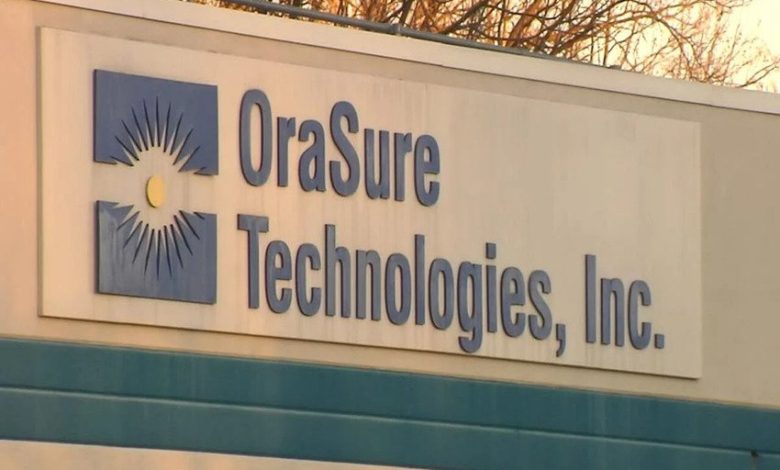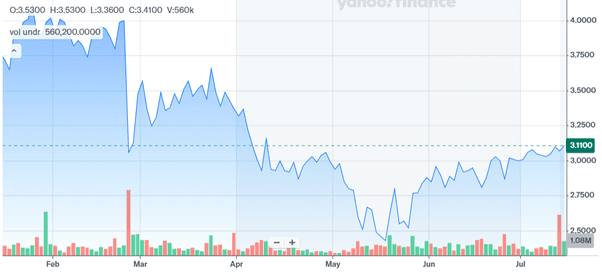OraSure’s Turning Point: Why Serial Deal-Maker Ron Zwanziger Tried (Again) to Take It Over

OraSure Technologies (NASDAQ:OSUR), a prominent name in rapid diagnostics, has once again attracted acquisition interest from renowned healthcare entrepreneur Ron Zwanziger, marking his second attempt to bring the company under his control. In June, Zwanziger, backed by a group of unnamed investors including a Wall Street financier, made an unsolicited, all-cash offer of $3.50 to $4.00 per share for the Pennsylvania-based firm—representing a modest premium over OraSure’s then-market price of $3.18. The company’s board swiftly rejected the bid without any formal engagement, echoing its earlier dismissal of a 2022 stock-based merger proposal from Zwanziger. Despite the brush-off, the repeat interest signals strategic intent. But the biggest question here is – why OraSure does remain an appealing takeover target for Zwanziger? Let us find out.
Declining Valuation Amid Strategic Pivot Offers Turnaround Opportunity
OraSure’s depressed stock price and operational reset make it a compelling target for a turnaround specialist like Ron Zwanziger. The company has lost more than three-quarters of its market value over the past five years, largely due to the post-pandemic decline in COVID-19 test sales, which once fueled its top line. Despite this, OraSure retains significant infrastructure, proprietary technology, and a cash balance of $248 million with zero debt. This financial cushion enables room for transformation without requiring aggressive restructuring. The company is actively transitioning away from its riskier legacy segments, such as risk assessment testing, and reorienting toward a diversified diagnostics and sample management model. By insourcing manufacturing and consolidating operations in Bethlehem, Pennsylvania, OraSure expects to realize operating efficiencies and improve margins by late 2025 and into 2026. Such conditions offer an attractive runway for a buyer like Zwanziger, who has a history of identifying undervalued diagnostic companies and streamlining their operations. Furthermore, the $40 million share buyback authorization signals undervaluation even from the company’s own board. While the board rejected the bid, the fundamental mismatch between OraSure’s cash-rich balance sheet and depressed valuation may make it a ripe target for a buyer who believes in its potential under leaner, more experienced leadership. The absence of long-term debt also means an acquirer can repurpose cash flows without servicing interest obligations. In essence, the declining valuation is not just a weakness—it could be a deliberate setup for a hands-on investor looking for asymmetric upside through operational improvements.
Proven Diagnostic Portfolio with Global Reach and Regulatory Advantages
Zwanziger’s interest is likely driven in part by OraSure’s defensible and globally recognized diagnostics portfolio, which includes differentiated offerings like the OraQuick HIV and HCV self-tests. These are not generic tests—they hold unique regulatory credentials, such as WHO prequalification for the HCV self-test, making it the only such test currently validated by the WHO for global deployment. Despite short-term funding uncertainty from public health bodies like PEPFAR and USAID, OraSure’s long-term diagnostics value lies in its ability to serve both developed and underserved healthcare systems with easy-to-administer, rapid, and oral-based self-tests. This value proposition becomes especially important as healthcare systems globally shift towards decentralization and point-of-care solutions. In Q1 2025, OraSure’s diagnostic revenue grew 8% year-over-year, driven largely by international sales, including first-time orders from a National Health Ministry in Africa. The company also saw increased usage of its HCV test in emergency rooms and added new distribution channels like Everlywell for its OTC HIV tests. The firm’s diagnostic platforms cater not just to infectious disease but also to reproductive health and wellness segments through partnerships with hospitals, pharmacies, telehealth platforms, and DTC testing companies. Moreover, its new syphilis test and the upcoming Sherlock platform for low-cost molecular diagnostics, starting with chlamydia and gonorrhea, add depth to the pipeline. All these regulatory and commercial elements provide a strong foundation from which Zwanziger could scale or reposition the product offerings. Owning such a portfolio would offer him a foothold across public and private health verticals, aligned with global health priorities.
Early-Stage Innovation with Sherlock & Proprietary Technologies
The integration of Sherlock Biosciences—acquired in late 2024—gives OraSure an innovative molecular diagnostics pipeline that may have significantly influenced Zwanziger’s renewed interest. Sherlock brings CRISPR-based diagnostics and a low-cost disposable platform that OraSure is rapidly advancing toward FDA submission by the end of 2025, with CT/NG (chlamydia and gonorrhea) testing as the lead indication. The technology, if cleared, could lower testing costs while broadening access in sexual health—a market Zwanziger is deeply familiar with, given his legacy with companies like Alere. OraSure’s existing IP in saliva and urine-based diagnostics complements Sherlock’s DNA-centric tools. The company is also on track to submit its Colli-Pee urine collection device for FDA approval, a product already in use through partnerships like Color Health’s at-home cervical cancer test. Another strategic addition includes microbiome extraction kits launching in mid-2025, targeting research and clinical applications in dermatology, women’s health, and gastrointestinal diagnostics. All these technologies expand OraSure’s play beyond just infectious diseases into genomics, proteomics, and microbiome science—areas that are fragmented and ripe for consolidation. For a deal-maker like Zwanziger, the combination of proprietary diagnostics platforms, early-stage clinical assets, and full manufacturing control offers a unique opportunity to create synergies, improve speed-to-market, and streamline commercialization. While OraSure continues to fund these initiatives internally, a more aggressive and experienced hand could potentially accelerate market entry, leverage the assets for licensing deals, or spin out high-growth verticals post-integration.
Fragmented Industry & OraSure’s Position as a Scalable Platform
OraSure operates in a diagnostics industry that remains highly fragmented, with giants like Roche, Danaher, Siemens, and Thermo Fisher dominating core segments, but smaller players like OraSure retaining niche strongholds. Zwanziger, who sold his last diagnostics company Alere to Abbott for $5.3 billion in 2017, has repeatedly shown an ability to consolidate assets in fragmented markets, optimize their operations, and exit at a premium. OraSure’s footprint across point-of-care diagnostics, sample management solutions, and collection devices positions it as a multi-pronged platform that could be scaled vertically (through expanded offerings) or horizontally (by acquiring adjacent technologies). Despite a near-term slowdown in its Sample Management Solutions (SMS) business due to a disrupted genomics customer relationship, the company has long-standing partnerships with players like Myriad Genetics and Fulgent Genetics. It also services over 100 customers globally with Oragene and ORAcollect—the only FDA-cleared saliva collection kits beyond COVID use. This diversity makes it more than a one-product company. The firm’s U.S.-centric manufacturing and shift toward in-sourcing adds cost efficiency and supply chain reliability—critical factors in a post-COVID regulatory and geopolitical environment. Moreover, the company's expansion into self-collected blood sample collection (via a partnership with Sapphiros and the Satio device) could unlock entirely new markets. In this context, OraSure is not just a manufacturer—it is a diagnostic platform with the infrastructure, innovation, and product breadth to serve as a base for further M&A roll-ups. That proposition could be highly attractive for Zwanziger, who is known to build around platforms with high scalability.
Final Thoughts

Source: Yahoo Finance
OraSure’s stock has been down 27% in the past year and off a staggering 77% over five years despite the management’s desperate turnaround efforts. Its weakened stock performance, funding volatility in key public health markets, and operational losses make it vulnerable and underwhelming to some investors. However, its deep product portfolio, cash reserves, pipeline innovation through Sherlock, and expanded manufacturing capability position it for a potential rebound. Ron Zwanziger’s renewed acquisition attempt, especially coming so soon after his previous one, underscores his belief that OraSure’s assets are underutilized and that value can be unlocked through sharper execution and leadership changes. Yet, the board’s outright rejection of the offer indicates a confidence in their transformation strategy and possible expectations of higher valuations ahead. Overall, we believe that OraSure is a stock worth monitoring closely and could generate a solid upside if the management is able to successfully execute the turnaround.




